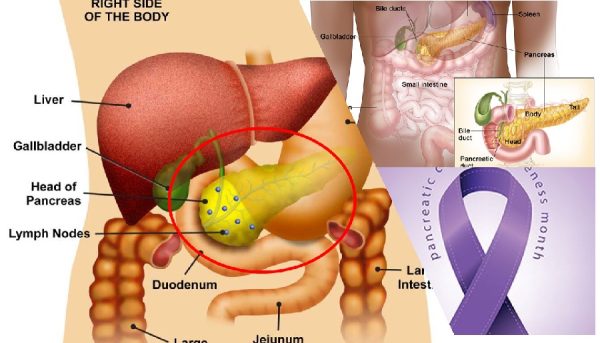
November is Pancreatic Cancer Awareness Month
November month is Pancreatic Cancer Awareness Month and the third Thursday, 18th of November is World Pancreatic Cancer Day. To educate, inspire and empower people regarding the pancreatic cancer this month is chosen as pancreatic cancer awareness month.
Pancreas is a gland that produce hormones such as insulin and enzymes that are essential for the body to digest food. Pancreas looks like tadpole with a head on right side and a tail that is wider. Pancreas measures about six inches and extends across abdomen, behind stomach and in front of the spine.
Pancreatic adenocarcinoma is the most common type of pancreatic cancer. Pancreatic neuroendocrine tumors (NETs) are a less common type. Adenocarcinoma starts in the exocrine cells that lines the pancreas ducts. Ducts are tiny tubes through which fluid passes through and enzymes are synthesized in ducts. Pancreatic cancer also starts in endocrine cells, where hormones are produced. This is called pancreatic neuroendocrine tumor or PNET.
There is no recommended routine screening to detect pancreatic cancer. It is often found during a blood test and regular imaging test. There are no specific symptoms to say that it is pancreatic cancer.
What are the possible symptoms of pancreatic cancer?
There are many medical conditions one can be suffering from. Symptoms a pancreatic cancer patient could be like many medical conditions. If any such symptoms one is experiencing, it is better to consult doctor for further diagnosis.
- Chronic pain in abdomen and back pain
- Weight loss
- Jaundice
- Nausea
- Bloating and floating stools
- Indigestion
- Feeling depressed
What Causes Pancreatic Cancer?
Cancer appears because of irregular growth of cells. When there is such abnormal growth and genetic mutation occur in endocrine and exocrine cells of the pancreas it results in cancer and ultimately tumor appears.
The risk factor for pancreas cancer is:
- Obesity
- Smoking
- Too much alcohol, coffee
- Certain infections of stomach – like ulcer causing bacteria Helicobacter pylori.
- Stress and depression
- Pesticides and asbestos type of chemicals
- Poor diet and unhealthy lifestyle
- Diabetes
- Chronic inflammation of pancreas Chronic pancreatitis
- History of other cancers such as – breast, ovarian or prostate cancers.
- Heredity could be the reasons too
Sometimes the patient might not have exposed to above mentioned risk factors and cancer could appear
Risk factors that cannot be changed:
- Age of the person – as we age chances of getting cancer is more
- Gender – Men more likely to develop pancreatic cancer than woman
- Race – Certain race are more vulnerable for pancreatic cancer like African Americans and Asians
- Family history – If cancer runs in family history, then inheritance of the cancer is more likely the reason and cannot be changed.
Prevention of pancreatic cancer:
- Watch your diet
- Maintain healthy weight
- Be physically active
- Avoid too much of alcohol
- Limit chemical exposure at workplace
- Practice meditation to manage stress
How pancreatic cancer is treated?
- Surgery
- Ablation of embolization treatment
- Radiation
- Chemotherapy
- Immunotherapy
- Pain control for cancer
Based on where and how much cancer has spread cancer treatment will be decided. If the cancer spreads, then the next treatment will be based on what treatment one already has gone through and once desire to get treatment – these are the few factors decides patient’s pancreatic cancer treatment.
After completing the treatment, follow-up appointments will help to answer any side effects caused by the treatment. A survivorship care plan will help to schedule meetings and tests. Pancreatic cancer causes severe weight loss and weakness due to poor nutrition. Guidance by a nutritionist is essential to address nutrition problems, get energy back and to gain healthy weight. Friends and family support, support groups, counselors can help to address emotional issues caused by cancer.
Pancreatic cancer is hard to detect and there are no proper screening methods. If any symptoms that are not going away and lingering for long time, contact your doctor to make sure it is not cancer. Take control of your diet, chose and implement healthy habits, healthy lifestyle to keep cancer away.
References:
- https://www.cancer.org/cancer
- https://www.foxchase.org/
- https://www.cdc.gov/
- https://www.cdc.gov/nceh/tracking/topics/Cancer.htm
Image credit: https://www.cancer.gov/
Author: Sumana Rao | Posted on: November 10, 2021
« India Crosses Milestone Of One Billion Covid Vaccination It Is Not Over Yet, Omicron the New Variant of Covid-19 In South Africa Raises Concerns »






















Write a comment